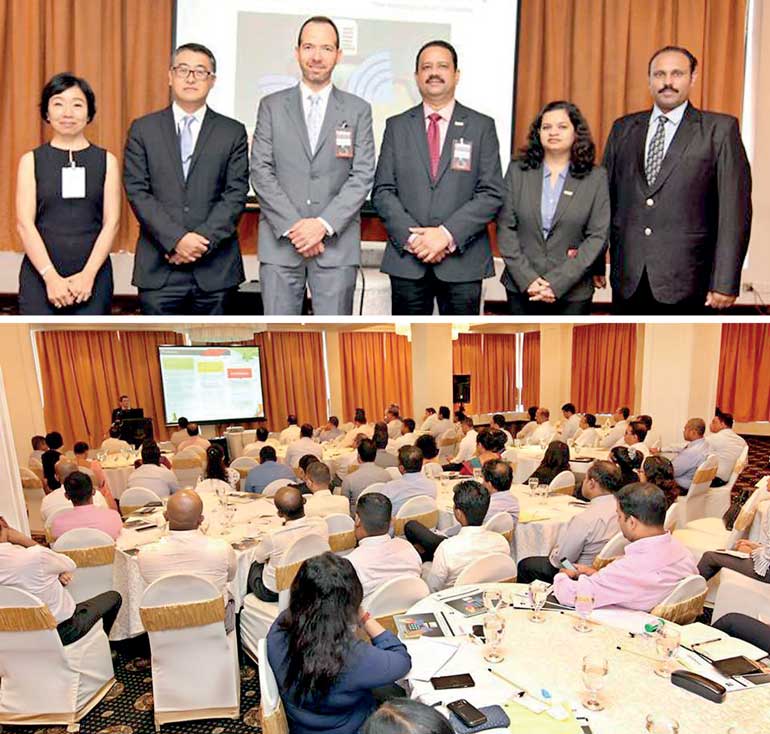Saturday Feb 21, 2026
Saturday Feb 21, 2026
Wednesday, 11 October 2017 00:00 - - {{hitsCtrl.values.hits}}
 Fintelekt, in partnership with the Asian Development Bank (ADB) organised a joint seminar on Digital Payment Systems, Mobile Money Services and Agent Banking in Colombo recently.
Fintelekt, in partnership with the Asian Development Bank (ADB) organised a joint seminar on Digital Payment Systems, Mobile Money Services and Agent Banking in Colombo recently.
It was attended by over 90 delegates across banking, financial services, insurance, telecom and financial technology service providers in Sri Lanka.
The objective of the seminar was to disseminate the highlights from ADB’s recent research on the subject. In addition, the seminar featured speakers and panellists who led discussions throughout the day in areas such as opportunities within existing distribution systems, the potential for fintech-led disruption, collaborative frameworks, and regulatory expectations for the success of digital payment systems and greater financial inclusion.
Fintelekt Advisory Services Managing Director Shirish Pathak welcomed the delegates and set the context for discussions during the day. This was followed by an address by Tadateru Hayashi, Senior Country Economist, Sri Lanka Resident Mission, Asian Development Bank. Hayashi stressed the need for increasing the adoption of technology based financial instruments, formal remittance methods and access to finance, as well as strengthening the commitment towards financial literacy within the country.
Mondato LLC Chief Executive Officer Judah Levine presented the keynote address. Levine shared the findings of the ADB study on ‘Promoting Remittance for Development Finance’ which covered digital payment systems, mobile money services and agent banking in Bangladesh, Nepal and Sri Lanka.
The research highlights the progress made on real-time payment platforms as well as other wholesale services. It points out that the country has high bank account penetration, but many are dormant or occasionally used. It also notes the presence of a limited fintech ecosystem as entrepreneurs leave for other regional centres.
The other main considerations communicated through the presentation were that:
Sri Lanka can leverage the opportunity to leapfrog the digital journey beyond traditional growth in banking through disruptive and innovative solutions. This will give rise to direct benefits from digitalisation, as well as indirect benefits such as the creation of an entrepreneurial ecosystem which will further drive growth
The greater adoption of digital payments and mobile money will require the creation of strong use cases
The current environment necessitates the enablement of payment technologies for increasing the level and penetration of e-commerce.
The recommendations to the Regulators in Sri Lanka were to consider the introduction of proportional Know Your Customer (KYC) norms, the authorisation of SIM registration for KYC for all institutions offering mobile payments, creating a regulatory sandbox for a transparent framework for new services beyond current regulations, consolidation of current legislation on mobile payments and the introduction of an overreaching data protection law, among others.
The keynote address was followed by two presentations. NDB Bank Vice President Delrene Seneviratne shared the findings of a recent study on mobile banking as a channel of financial inclusion. The survey covered 50 street food vendors/small scale traders in urban Colombo. The findings highlighted the low level of awareness among the sample for mobile banking, despite the access to banking as well as telecom services.
Seneviratne highlighted the potential for digital financial inclusion to expand financial access by lowering transaction costs to the lender and improving convenience for the customer. She urged the banking community to consider an unconventional and proactive role to increase affordability and awareness of mobile banking amongst low income households. She also called for a regulatory framework that creates a transparent and level playing field for mobile money services as a part of the overall development roadmap envisioned for Sri Lanka’s electronic payments landscape.
Synapsys Managing Director and CEO Dinesh Fernandopulle presented a case study for successful implementation of MBANX TIPS, a technology platform for digital payment systems. MBANX TIPs provides an integration solution that links the hitherto unbanked or underbanked tea small holder community in Sri Lanka, with tea factories and banks in real time. The impact of the solution has been witnessed through a reduction in indebtedness among the community, cost benefit, greater transparency, accuracy and financial protection to the farmers.
The post-lunch session comprised a panel discussion on the topic of ‘Improved Financial Inclusion in the country’, which was moderated by Fintelekt Advisory Services Managing Director Shirish Pathak. The panellists were Ruwan Bakmediniya, Head of Information Technology, Hatton National Bank, Vipula Dharmapala, Director and CEO, InsureMe, Gamini Swarnapala, General Manager, Lanka Financial Services for Underserved Settlements and Judah Levine, Chief Executive Officer, Mondato.
The key take-away from the panel discussion was that the infrastructure for greater financial inclusion in terms of smartphone penetration, 4G network enablement, fibre connectivity and telecom reach is in place. It is now up to players to leverage the infrastructure to reach out to the unserved and underserved populations and improve the quality and depth of banking services provided to these sections.
The panellists agreed that the current regulatory environment in Sri Lanka is already supportive, with the Central Bank of Sri Lanka having proposed a five-year national payment roadmap for greater security measures and awareness campaigns to educate the public on the advantages of digital payments. However, to encourage greater innovation and disruptive technologies, some degree of relaxation in regulatory norms, as well as KYC norms would be necessary.
Further, the creation of strong use cases which would bring in some commercial viability for banks would provide greater justification for improving financial inclusion. A practical suggestion was for banks to set up incubators or set aside equity for fuelling innovation in technology.
Overall, the ADB-Fintelekt seminar reinforced the optimism about digital payments and mobile money in Sri Lanka. The existing banking and telecom infrastructure can be leveraged better to reach the goals of financial inclusion, aided by greater clarity and direction from the regulators. Further, a fintech ecosystem needs to be encouraged for greater technological innovation within the country.